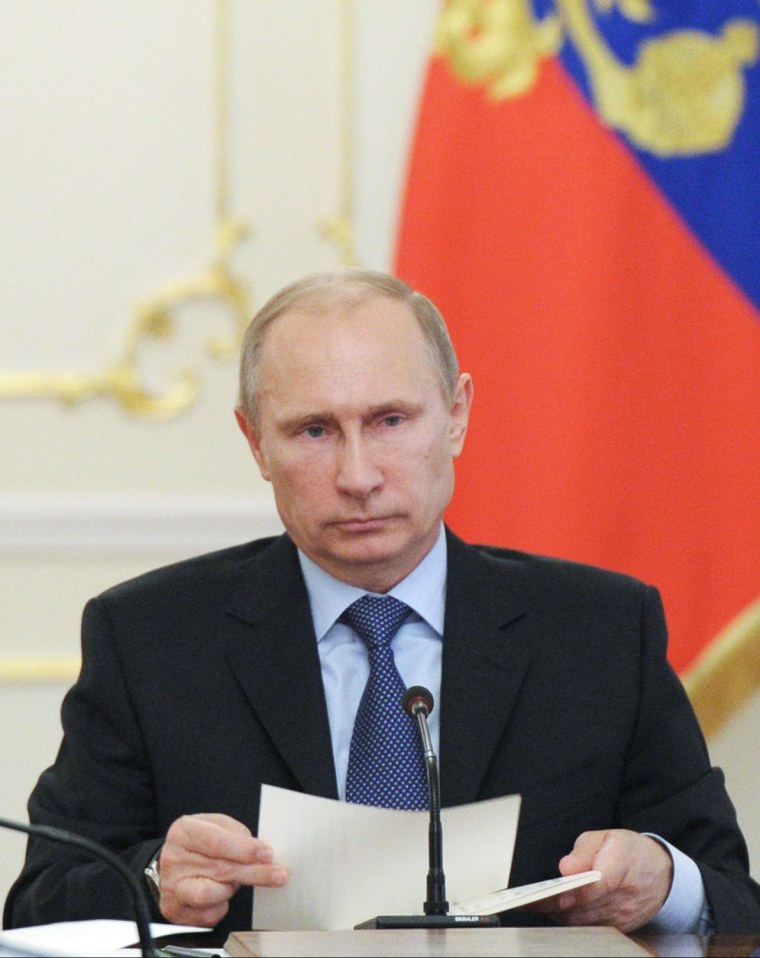
News analysis
MOSCOW - Russia has provided unwavering support to President Bashar Assad in spite of claims that his Syrian regime has used chemical weapons, harrowing images of dead children and an estimated 100,000 killed by all sides in the civil war.
So seen from across the Atlantic, Moscow can look stubborn, even ruthless.
But President Vladimir Putin’s proposal to put Syrian chemical weapons under international control, and now his letter to the American people through The New York Times, casts Russia’s behavior in a different light: Diplomatic and pragmatic.
Many will be skeptical. Putin likely has many motivations for the course he has set, including self-interest. And the Russian initiative may unravel when Russia’s Foreign Minister Sergei Lavrov meets Secretary of State John Kerry in Geneva on Thursday. But from Russia’s point of view, Putin’s approach to Syria can be seen as understandable and logical, analysts say.
There is genuine concern within the Kremlin that an American strike could lead to an escalation or even a wider war.
“If anybody thinks that bombing and destroying the Syrian military infrastructure, and leaving the battlefield for the opponents of the regime to win, would end everything -- that is an illusion,” Lavrov said in August.
There are Russia’s fears about terrorism.
"A strike would increase violence and unleash a new wave of terrorism," Putin said in the Times op-ed. "Hundreds of militants from Western countries and even Russia, are an issue of our deep concern. Might they not return to our countries with experience acquired in new Syria?"
Putin has consistently compared his battles with separatist Muslim groups in the Russian Caucasus with the terrorism in the West.
“Russia is a victim of international terrorism too,” Putin said after the April 15 Boston bombings that killed three and injured an estimated 264.
The attack had added importance in Russia because the suspected perpetrators, Dzhokhar Tsarnaev and his older brother Tamerlan Tsarnaev, who was killed in firefight after the attack, have roots in the troubled Russian republic of Chechnya. An Islamic insurgency that followed vicious wars between Russian troops and Chechen separatists has spread throughout the region.
But there are other practical issues at stake for Russia -- issues not mentioned in Putin’s letter.
Of great interest to the Russians is its navy’s access to the strategically important base in the port of Tartus on Syria’s Mediterranean coast, as well as the arms it sells the Syrian government, said Amy Knight, a leading U.S. historian and expert on Russia. And there's the arms trade: The Kremlin sent $1 billion worth of weaponry to the Assad regime in 2011, the year the war broke out, she said.
And beyond the practical considerations are matters of principle for Russia, Kremlin watchers say.
“In the Iraqi crisis, the Libyan crisis and now the Syrian crisis, Putin perceives the desire by the West to kick out those the West doesn’t like,” according to Moscow-based independent journalist Konstantin von Eggert. “And I think that he always thinks, in the end, about himself and his regime.”
“He sees himself as a defender of the principle of the inviolability of the internal affairs of the state,” he said. “Essentially, what Russia wants to tell the world is that no one, including the U.N., is going to decide who is going to run which country.”
And Assad’s fall would indeed set a bad precedent for Putin, Russia expert Knight added.
“Putin and his colleagues do not like the whole idea of seeing a strong dictatorial leader fall. It is a bit close to home for them and does not set a good example,” she said.
Finally, Putin’s international standing is surely top of mind.
“Putin feels that he is a patriarch of world politics,” von Eggert said. “He was around as a de facto leader of Russia in late 1999 when no one knew that George Bush was going to be elected as president of the United States. How long ago was that!”
Putin, perhaps, looks least like a statesman when he argues that "there is every reason to believe" the chemical weapons attack was carried out "by opposition forces"and not the Syrian regime. But he then suggests that Russia is siding with Israel referring to, "reports that militants are preparing another attack — this time against Israel."
The large numbers of Russian citizens in Syria would also preoccupy Putin, Moscow-based journalist Pavel Felgenhauer says.
“There are Russian advisers, no one knows how many, plus Russian military and civilians in Syria. There may be thousands of Russian civilians there,” he said.
Ultimately everything Putin does needs to be viewed from a long-term perspective, according to von Eggert.
“He’s only focused on several things that he thinks are his lifetime achievements. That is keeping Russia respected or at least noticed on the international scene, keeping any foreign interference at bay and keeping himself in power,” he said.
James Nixey, head of the Russia and Eurasia Program at the London-based Chatham House think tank, agreed that Russia’s motivation was strategic.
“Russia is so desperate for influence it takes anything it can," he said. "It is not that it adores Assad by any means.”
Putin’s letter does not reflect on the reasons critics in the West might dislike his government. His attempts to stamp out a growing protest movement, his government’s promotion of nationalism with a hostile edge, anti-gay legislation and locking up illegal immigrants. Then there is Edward Snowden, the former NSA contractor who is in Russia despite the United States' pending extradition request.
But as talks with the U.S. begin, the prize for Putin will be putting Syria’s chemical weapons out of reach, while keeping Assad in power and being celebrated as a peace maker.
It’s possible Putin’s proposal is simply a delaying tactic, with stopping U.S. strikes the key aim. But as he plays this game of diplomatic chess, Putin may feel that he’s in sight of checkmate.
NBC News' Alexander Smith contributed to this report from London.
Related: